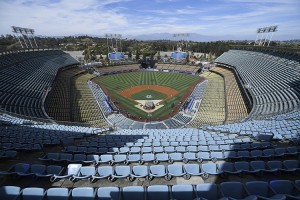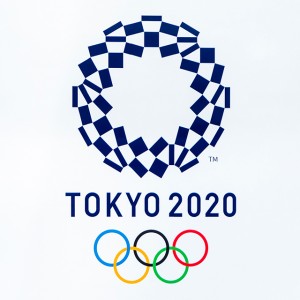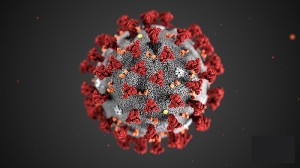COVID-19: Sports on Hold
April 8, 2020
Today, April 8, Behind the Headlines was originally scheduled to cover this year’s National Collegiate Athletic Association (NCAA) basketball championships in the United States. However, the men’s and women’s NCAA tournaments were canceled in March because of the ongoing COVID-19 pandemic. The tournaments were not alone: nearly all sports leagues and sporting events have been suspended or canceled because of COVID-19, putting sports on hold in all corners of the globe. COVID-19 is a pneumonia-like disease caused by a coronavirus, a type of virus that also causes the common cold and other diseases of the upper respiratory system. To date, COVID-19 has killed more than 80,000 people among nearly 1.5 million confirmed cases.

Dodger Stadium sits empty in Los Angeles, California. Baseball stadiums, usually teeming with people at this time of year, are going unused throughout the world as leagues have been suspended or canceled because of the COVID-19 pandemic. Credit: John McCoy/Getty Images
All collegiate and high schools sports in the United States were suspended or canceled because of COVID-19 (the schools were then closed), and Little League Baseball, too, had to put off the start of its season. In professional sports, Major League Baseball, which had begun its annual spring training, canceled all exhibition games on March 12 and indefinitely delayed the start of the regular season. Minor League Baseball shut down, as did baseball leagues in Japan, Mexico, South Korea, and other countries. The National Basketball Association suspended its season on March 11, and basketball leagues in other countries were also shut down. The recently launched XFL football league suspended its first season on March 12, and the fledgling Basketball Africa League also lost its inaugural season, which had been scheduled to start on March 13.

The COVID-19 pandemic forced the postponement of the 2020 Summer Olympic Games in Tokyo until 2021. Credit: Pakpoom Phummee/Shutterstock
Major League Soccer and the National Hockey League suspended their seasons in March, and other hockey and soccer leagues around the world were forced to do the same. Rugby and cricket leagues and tournaments were suspended, as were the upcoming Masters Tournament, PGA Championship, U.S. Open, and British Open golf competitions. In tennis, Wimbledon was canceled for the first time since World War II (1939-1945), and the French Open was postponed. The Kentucky Derby horse race and the Indianapolis 500 auto race were postponed, and the Monaco Gran Prix auto race was canceled. (All three races are usually run in May.) Marathons around the world have been canceled or postponed, and athletes of all types will have to wait for the Summer Olympic Games in Tokyo, which were postponed a year until July 2021.

This illustration of Coronavirus Disease 2019 (COVID-19) shows the spikes on the outer surface of the virus that appear as a corona, giving the virus its name. Credit: Centers for Disease Control and Prevention (CDC)
Early in the COVID-19 pandemic, a number of sports continued to be played without fans in attendance, but fears for the safety of athletes quickly led to the canceling of the competitions themselves. Suspended and postponed sports leagues and events have issued optimistic timelines about when they will resume or take place. All timelines, however, depend on the containment or continued spread of COVID-19.
The sports cancellations are part of social distancing, also known as physical distancing, an effort to slow or stop the spread of a contagious disease by limiting contact between people. Social distancing is most effective against illnesses that can be transmitted by coughing or sneezing, direct or indirect physical contact, or through the air. Typical social distancing measures call for the closing of such public places as sports arenas, schools, restaurants, museums, and many offices and stores. They may also call for people to maintain a distance of around 6 feet (2 meters) between them in public places.


